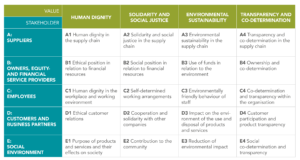(Editor Note: Insight Bytes focus on key economic issues and solutions for all of us, on Thursdays we spotlight in more depth Solutions to issues we have identified. Fridays we focus on how to build the Common Good. Please right click on images to see them larger in a separate tab.)

Image: Your Little Planet
In the past week, American Express won a gag order over merchants when the Supreme Court handed down a decision that allowed the huge financial services company to require all their merchants not to tell their consumers other cards had cheaper swipe fees. Amazon announced the acquisition of Pill Pack a mail order pharmacy company, which sent financial shock waves through the drug store industry. So, it goes on, a Corporate Nation State (CNS) like American Express or Amazon have their way limiting consumers choices to reduce costs and to take over the drug marketplace with no fair market rules in place.
Are these two companies focused on building the common good, fair play rules in the marketplace, doing what is right for consumers and taking social responsibility for the impact of their decisions? No. There is no countervailing power when Congress, The Supreme Court and the Executive branch are all doing the bidding of CNS organizations.
Corporations run our federal government by donating hundreds of millions of dollars (they have no campaign donation limits) each year to congressional campaigns through super PACs. Some CNS entities have large lobbying offices in Washington, like Amazon with 94 lobbyists knocking on Representative and Senator doors every day! Do we have an army of lobbyists twisting arms for our interests? No.
Where can we look for corporate reform to build the common good? Larry Fink, the CEO of Blackrock, a $6.3 trillion institutional investment corporation, sent a letter to 1000 CEOs of companies they invest in telling them that beyond profits they would be evaluated on how well they are taking care of the environment, responding to climate change, having a diverse workforce, and fairness with their employees. We applaud Mr. Fink’s move, and look to more investors to call upon corporate management to be held accountable for their social responsibilities.
There are corporate accountability frameworks that have been receiving widespread acceptance and government support. In the European Union a group called the Economy for the Common Good (ECG), has over 2400 corporate endorsers and almost 10,000 individuals support their effort to require corporations report on a Common Good Balance Sheet their social responsibility activities. The EU has adopted a non-binding directive requiring companies of 500 employees and ‘public interest’ to report on human rights, diversity, labor rights, the environment, health and anti-corruption measures. The report is not included with the corporate annual report and is therefore not audited.
The Common Good Balance Sheet is divided into four key accountability areas: human dignity, solidarity and social justice, environmental sustainability, and transparency and co-determination:

Source: Economy for the Common Good – 6/29/18
The ECG is now working to make actual changes in corporate behavior by focusing on gaining support for these eight issues:
- universal (all values and relevant issues)
- legally binding
- measurable and comparable (e. g. using points)
- externally audited
- generally understandable (for the public)
- public (on all products, websites, shop doors)
- developed in a participatory process
- linked to legal incentives (taxes, tariffs, …)
The first phase has been completed of their initiative to gain EU nonbinding support next they look for a binding EU directive by 2020 followed by integration financial reporting.
We need to find corporate leaders in the US that see the vision of an Economy for the Common Good, embrace it and implement its ideas in their day to day operations – while measuring the results to show it is a better way to run a business. A business can build an economy that works for all and still be a thriving profitable enterprise.
